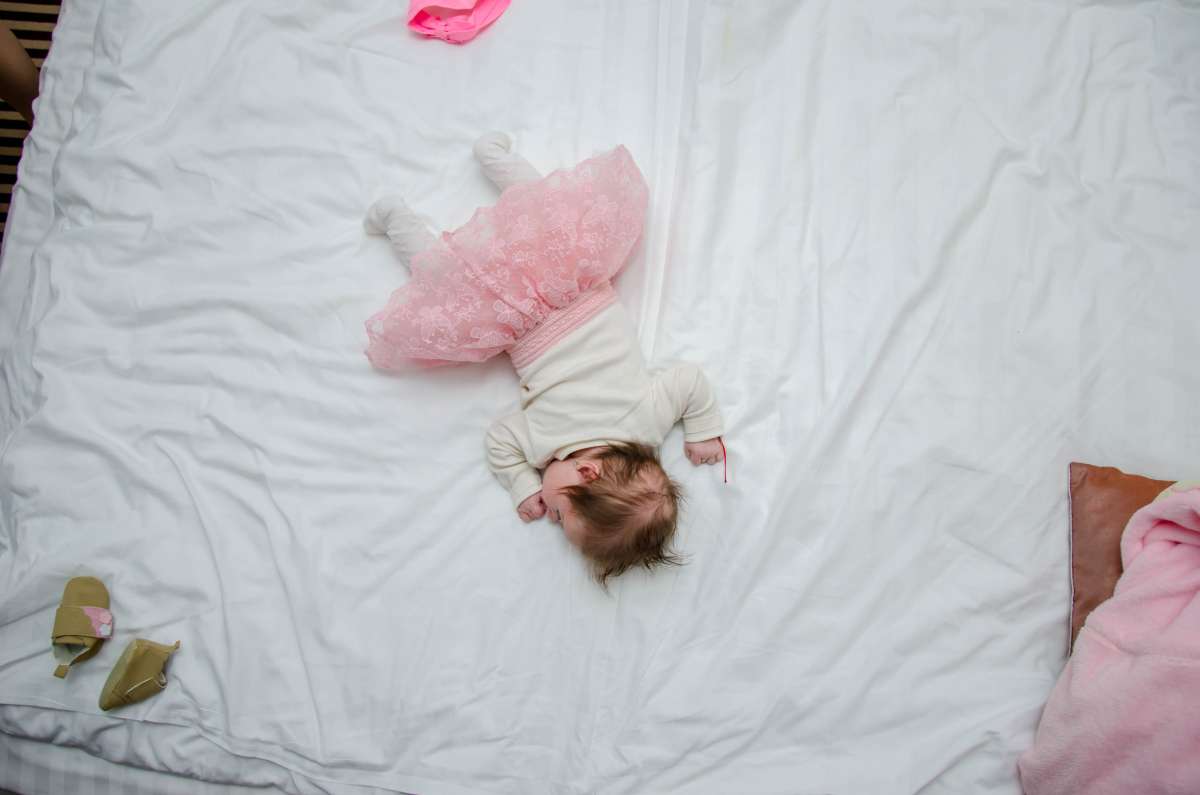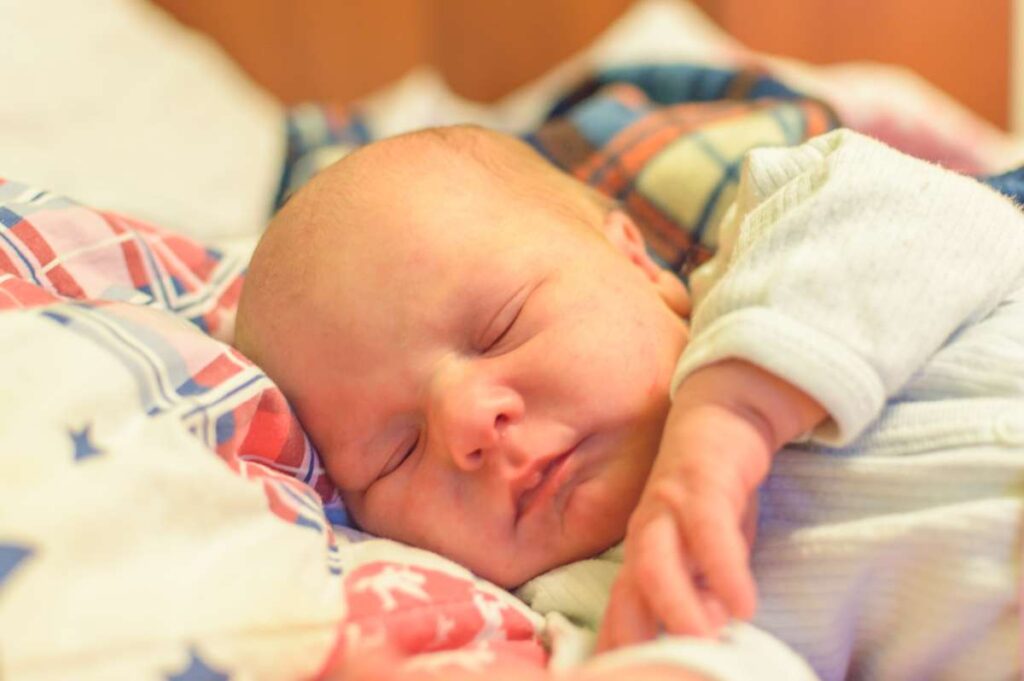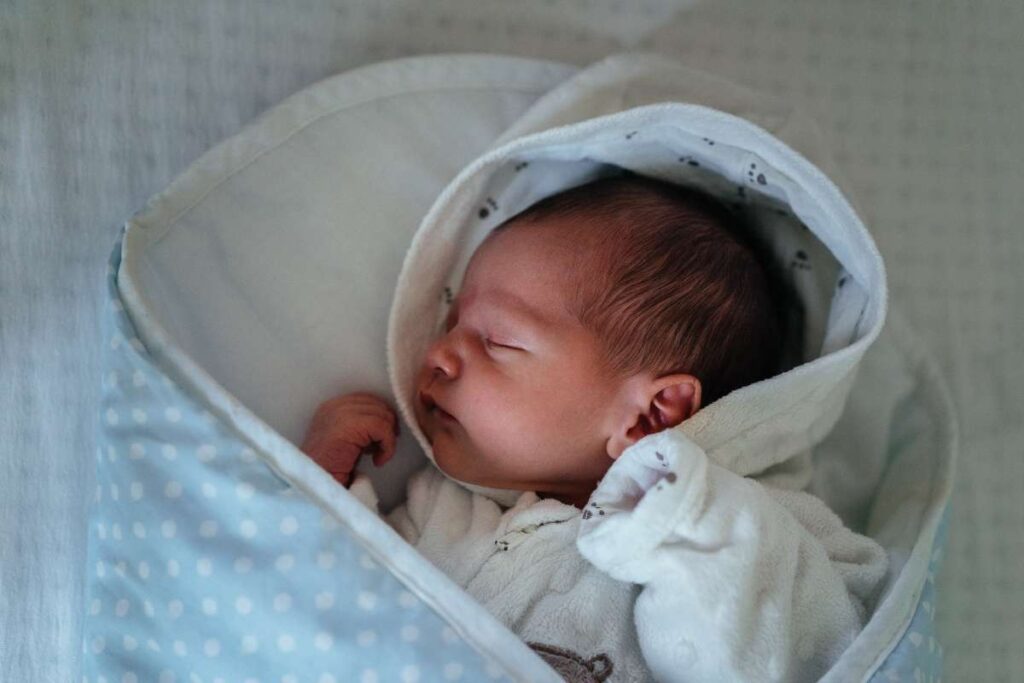It turns out that the benefit of an early bedtime isn't limited to the extra relaxation time it affords at the conclusion of a busy day (although that is a nice perk).
Depending on their age, some kids need to hit the hay as early as 6:30 or 7 p.m., according to the available data. Not all kids require such an early bedtime, but it's something to consider if you believe your kid could benefit from it.
Children's reactions to going to bed overtired can vary widely, but they tend to be unfavourable. Your child may appear to fall asleep easily due to weariness, but this may really disrupt their nighttime sleep and set in motion a pattern that is difficult to escape.
Developmentally appropriate sleep and waking times for infants and young children vary with age.
Your baby isn't learning how to fall asleep on their own if you put them to sleep later than their body can take; instead, they're either falling asleep from weariness or, worse, having difficulties falling asleep because they're over-stimulated and over-tired.
This is also why some kids get hyper when they're sleep deprived; they didn't get enough shut-eye within their "window of opportunity." This typically leads to a tantrum and a fight right before bedtime.
So, let's analyse the causes of this phenomenon (just in case you need a bit more convincing 😉
Most people are familiar with melatonin, also known as the "sleepy hormone," which is naturally produced by all humans (with the exception of infants) as the day winds down.
When we listen to our bodies and allow melatonin help us drift off at night, we wake up feeling refreshed and ready to face the next day. If we don't get enough sleep during our allotted window, our overtired bodies respond by producing more of the stimulating hormone cortisol.
In other words, instead of calming down and sleeping, our bodies go into "fight or flight" mode (what it originally wanted to do but now will struggle to do).
Here's a rundown of some suggestions based on chronological age and current developmental stage. On the other hand, you should pay attention to your child's signs of exhaustion and put him or her to bed when he or she appears (those cute little yawns and eye rubs serve a purpose).
Following are some suggested cutoff times for the day, ordered by age (remember that the lower range corresponds to the younger age):
- Newborns (0 - 3.5 months) (0 - 3.5 months) - 7:30-9:30 pm (later because circadian rhythm isn't yet driving sleep and because neonatal sleep cycles haven't fully developed)
- Sged 3.5-6 months - 7-8:30 pm
- Infants 6-12 Months Old, 6-8pm
- 12-36 months - 6:-7:30pm
- 2 - 10 years - 7-8:30 pm
- 10 years+ - 7:30-9pm
Although these are our suggestions, please keep in mind that every child is unique and may have specific requirements depending on their routine, nap times, etc. However, no one of any age should go to sleep before 6 o'clock or wake up before 8:30 a.m. (except newborns).
If your child's sleep patterns do not fall within the stated limits, bedtime may be to blame for his or her lack of nighttime or daytime rest.
Read our piece on regular bedtimes for further research that supports the value of an early bedtime.
Studies have found that children who go to bed earlier have higher cognitive functioning, are less likely to become obese as adults, and get an extra 78 minutes of sleep per night.
This last one is crucial because sleep deprivation of just 30-60 minutes has been shown to impair performance the following day.
It is never too late to start phasing in an earlier bedtime for your youngster. This should also give you, the parents, some time to yourself, right?
FAQs About Baby Bed
Quality sleep happens before midnight for most babies (and adults!), so don't be afraid of an earlier bedtime. Find your child's “sweet sleep spot”, then stick to it – for babies younger than 12 weeks, bedtime should be around 9 PM to 10 PM. Babies older than 12 weeks do best with bedtime around 7 PM to 8 PM.
Bedtime should be no later than 7:00-8:00 pm. If you are finding that the baby starts to wake frequently at night or earlier in the morning than usual, try scaling back bedtime even more, possibly to even 2.5-3 hours after the last nap ends.
An ideal bedtime for a three-month-old baby is between 7:30 – 9:30 pm. This is based on the developing circadian rhythm (or body clock) of a three-month-old and also fits in with the 9 – 11 hours of nighttime sleep needed.
Newborns (0 - 3.5 months) - 7:30-9:30pm (later because newborn sleep cycles aren't yet in place and circadian rhythm isn't driving sleep) 3.5 - 6 months old - 7-8:30 pm. 6 - 12 months old - 6-8pm. 12 - 24 months old - 6:-7:30pm.
For babies, early to bed does not mean early to rise! Most babies sleep longer with an earlier bedtime. Many parents are afraid to put their baby to bed so early, thinking they will then face a 5 a.m. wake up call.
Learn The Best Time To Put Your Infant To Sleep At Night
It is crucial that there is not too much time between the last nap and bedtime, as this can lead to sleep disruptions during the night, as noted in the introductory paragraph.
Listed below are the typical number of naps required by babies of each age, as well as the recommended length of time for the final stretch before bedtime.
It's important to remember that if the duration of the previous nap was already minimal, it may be necessary to reduce it even further.
A time frame of 0-2 months
It is normal for infants of this age to snooze four or more times daily. Although it is normal for a baby to go to sleep at 9 o'clock or later, it is vital to gradually advance the bedtime to earlier hours, starting at around 6 to 8 weeks. By the time the infant is two months old, he or she should be done napping by 6:30 p.m. Bedtime, following the conclusion of any naps, should occur between 6:30 and 8:30 p.m.

Thirty-three days
Babies of this age group benefit from adhering to a strict four-nap routine, the last of which should stop no later than 5:30 p.m. About 1.5–1.75 hours following the earliest nap of the day is ideal for bedtime.
Please note that this is a "asleep by time" event, and so the baby should be put down at least 15 minutes in advance. Because of this, you shouldn't stay up past 7:15 p.m.
Over the course of 4 months
Babies will go from taking four naps every day to only three. Your baby's sleep schedule may therefore vary from day to day, from four to three naps, depending on when she first woke up and how restful her naps were.
If you've had a day of three naps, you should probably get to bed early. When changing from one nap to another, an early bedtime need not be feared; in fact, it could prove to be your saviour. At four months old, nap time should stop by 5:00 p.m., and bedtime should follow approximately 2-2.25 hours later.
Thus, once again, this means that 7:15 p.m. is the latest that bedtime should be.
A time span of five months
Babies this age should have firmly established a three-nap routine. By 5:00 p.m., naps should be over, and bedtime shouldn't be more than two to two and a half hours after the previous sleep.
Since you've recently cut down from four to three naps, and since kids this age still require 11 to 12 hours of night sleep with up to two night feedings, this implies bedtime will be about 7:00 to 7:30 pm, which is extremely age-appropriate.
Six to seven months
Babies still require three naps per day at this age, and the majority of them continue with this pattern until they are 8 or 9 months old. About the latest, naps should cease at 5:00 p.m., and bedtime ought to be 2.25 to 2.75 hours later. Therefore, 7:45 p.m. is the latest acceptable bedtime for children of that age.
8.9 months
Most infants go to a two-nap schedule at this age, skipping the third nap. On the days when we are unable to accommodate a third nap or the baby flat-out refuses it, we will employ an extremely early bedtime to help with the nap transition.
Feel free to tuck your little one in as early as 4:45 p.m. That's not to say the infant will start waking up at the crack of dawn. If you want to sleep in later at night, try reducing your daytime napping.
Your infant will have to make up for the missing sleep time during the night because you just missed a complete sleep cycle. When it comes to infants younger than nine months, our top priority is to ensure they have safe and sound sleep at night.
If the infant wakes up wailing every three to four hours throughout the night, a late catnap and subsequent later bedtime will not help. Naps should be over by 4:00 p.m., and bedtime should be 3–3.75 hours later. Therefore, you should go to bed no later than 7:30 or 7:45 pm.
Time Frame: (10 - 18) Months
Babies who fall inside this age range but are still taking two naps each day should read this section. Babies often continue taking two naps until they are 15 months old (median age is 13 months).
The longer we can put off giving up that second nap, the easier this shift will be on you.
Once again, naps should cease by 4 o'clock in the afternoon, and bedtime should be set for 3 to 4 hours after the last nap ends. For infants under 12 months, the lower end of that range is preferable.
The afternoon sleep may grow shorter and less restful as the move to a 2-nap schedule draws near.
If you want your infant to get enough sleep each night, you'll need to cut back on the time between this nap and bedtime. You shouldn't linger in bed past 7:00 or 8:00 o'clock.
Try moving bedtime even further back, to 2.5-3 hours after the end of the last nap, if you notice the baby is waking more frequently at night or earlier in the morning than usual.
We're seeing a typical trend here as we approach the elimination of the second nap.
The Benefits of a Regular Bedtime Routine for Infants and Toddlers
Kids and babies require a great deal of restful sleep. By their second birthday, a well-rested youngster will have spent more time asleep than awake.
Babies have no set routine at first, but by the time they are six months old, the majority of them have adopted a sleep-wake pattern that is regulated by either the hours of sunshine or their circadian rhythm.
The best way to respect your child's internal clock and make sure he or she gets adequate sleep is to establish a regular, early bedtime. As it turns out, there are a number of advantages to going to bed at a reasonable hour.
In theory, a child may "sleep in" and acquire the required amount of sleep at a later bedtime, but in practise, this rarely happens. Around the hours of 6:00 and 7:30 in the morning, young children are awakened by their own body clock. If they go to bed too late, they will still be up, but they won't get as much sleep.
Babies who follow a regular schedule (including a suitable bedtime) are more likely to go to sleep quickly and remain asleep throughout the night. Such essentials can make a world of difference in the quality of your infant's sleep.
The same way that kids usually go to bed early, they also have a weary window between seven o'clock to eight o'clock at night. Most people have an easier time falling asleep and staying asleep if they go to bed at a reasonable hour. Toddlers and preschoolers should only take two naps during the day to get the equivalent of two full nights' sleep.
The Importance of the Sleeping Period
Both REM (Rapid Eye Movement) and non-rapid eye movement (NREM) sleep phases occur in infants and young children (Non-Rapid Eye Movement). In the REM cycle, when dreams occur, it is crucial to enter the NREM stage of sleep.
It is not often obvious to adults that they reawaken and re-settle briefly during the night between sleep cycles. Infants and young children do, too, and when they learn to self-soothe, they can go right back to sleep without even fully waking up or crying.
Staying up past a child's normal bedtime window reduces the child's ability to calm themselves. The ability to fall asleep independently at bedtime has positive effects on a child's ability to self-regulate during the night.
Kids Benefit from a Set Schedule
Those who employ a soothing nighttime ritual at home and in the school find this to be a welcome practise. A child's sense of safety is enhanced when they have a plan in place. They can prepare for bedtime when it's always at the same time.
It's not uncommon for people to try to create a soothing atmosphere in the run-up to bedtime by taking a bath, reading a story aloud, snuggling, and saying goodbye. The child's drowsy window may be missed and he or she may not be tired enough to fall asleep if bedtime is delayed.
This Smart Sleep Coaching App from Lumi features a full programme of video courses mixed with in-app tracking capabilities that will guide you step by step to a schedule that works for you and your kid.

Integration of Behavior and Thought
A study of Japanese 18-month-olds found that children whose bedtimes were later than 10 p.m. had poorer neurodevelopment than those whose bedtimes were earlier.
Another study analysed the intelligence test results of British seventh-grader girls. Children who had inconsistent bedtimes since the age of three had lower average scores.
That's More Than Just Your Mind
The disruption of circadian rhythms has been linked to metabolic health issues, according to a study done in 2009. Maintaining a regular eating and sleeping schedule in accordance with the sun's and moon's cycles has been shown to lower blood pressure, lower insulin levels, and normalise glucose levels.
Further supporting the idea that teenagers who go to bed later have a higher body mass index is the observation that they wake up at a later hour. Even after controlling for things like screen time and physical activity, the study still revealed a significant correlation between later average bedtimes during the workweek.
The whole family benefits from early bedtimes.
Put them to bed at a reasonable hour and use the clock to determine out what time dinner should be. Then, to take advantage of your sleepy time, prepare a lovely, easy, relaxing routine.
Your child will be less difficult to manage during the day and at night, and they will sleep better.
Once it becomes habit, it can be a great way to unwind and spend quality time with your child. Plus, you may have some quiet time before sleep without the kids.
Which Is Better for Babies and Toddlers: an Early Bedtime or a Late Bedtime?
Parents, you know that getting your kids to bed at a reasonable hour can have a significant impact on how the rest of the night goes. The best method to get your child to sleep through the night is to establish a relaxing bedtime routine that will let him or her drift off to sleep without your intervention.
When your infant or toddler goes to sleep is also important. We get a lot of questions from parents about the optimal time to put their babies and toddlers to bed, so we made a handy printable chart with our recommendations.
Do you think it's wise to go to bed early? Or should you encourage your kid to stay up later?
We've got the info you're looking for, so keep reading to find out our take on when kids should be in bed.
Babies Go To Sleep
When your kid is around two to three months old, you can begin transitioning towards a more consistent bedtime, ideally between eight and eleven o'clock at night. Now, I know this bedtime seems late, but trust me, it's on purpose.
Your baby's bedtime should coincide with yours at this point. Why? Because the initial evening stretch of sleep should coincide with your baby's longest overnight stretch of sleep (preferably the stretch of sleep right after the bedtime meal).
At around four months, you can start transitioning to an earlier bedtime: between four and ten months. Time for bed should be between 6 and 7/7:30 p.m. Putting your infant to bed at six or 6:30 p.m. may seem paradoxical; after all, wouldn't you expect him to wake up at dawn? However, keep in mind that sleep tends to invite more sleep.
Babies who go to bed at regular hours tend to sleep well and wake up at acceptable times since they are not overtired. However, a baby whose bedtime is delayed may be overtired. If that's the case, he'll probably be up too early the next day.
Around the ten-month mark, you may want to consider moving bedtime back to around 7:30 p.m. Why? In addition to the eight or more hours of nighttime sleep most children get now that they have learned to sleep through the night, they also take two or three hour naps during the day.
Your youngster may need a later bedtime if he or she is taking lengthy naps during the day. To the end of the year, this will remain true.
For napping toddlers, bedtime
Your kid will most likely keep taking two naps each day from the age of 12 months until the age of 15 or 18 months. A later bedtime, around 7:30 or 8 p.m., may be preferable when your kid is on a 2-nap schedule.
Your toddler will make the change from two naps per day to one nap per day between the ages of 15 and 18 months. Until she gets used to going to bed without a second nap, your toddler will likely need an earlier bedtime. A significant rise in nighttime waking and the necessity of more sleep training may result otherwise.
If it seems like you need to, go ahead and set your bedtime back to 6:30 or 7pm for a while. Furthermore, you may need to implement the earlier bedtime on days when your toddler's afternoon sleep is exceptionally brief.
However, once your toddler has settled into a routine with one nap, you'll probably need to ease him or her into a later bedtime. A toddler's bedtime may need to be pushed back to 8:30 or 9 p.m. if he or she is still having a long afternoon sleep between the ages of 2 and 3.
In this case, staying up late is recommended! Many of the parents we see persist in putting their older toddlers to bed at 7 o'clock every night, only to experience extreme frustration when their children don't go to sleep for another two hours.
The duration between when your older toddler wakes up from his or her nap and when he or she goes to bed should be at least five hours. Make sure to time your bedtime appropriately.
Conclusion
Some kids need to hit the hay as early as 6:30 or 7 p.m., according to available data. Not all kids require such an early bedtime, but it's something to consider if you believe your child could benefit from it. Pay attention to your child's signs of exhaustion and put him or her to bed when he or she appears. Every child is unique and may have specific requirements depending on their routine, nap times, etc. No one of any age should go to sleep before 6 o'clock or wake up before 8:30 a.m.
(except newborns). Bedtime for babies from birth is between 6:30 and 8:30 p.m. At four months old, nap time should stop by 5:00pm; bedtime is 2.25 to 2.75 hours later. Babies this age are still requiring 11 to 12 hours of night sleep with up to two night feedings. If you want to sleep in later at night, try reducing your daytime napping.
Naps should be over by 4:00 p.m., and bedtime should be 3–3.75 hours later. By their second birthday, a well-rested youngster will have spent more time asleep than awake. Toddlers and preschoolers should only take two naps during the day to get the equivalent of two full nights' sleep. Most people have an easier time falling asleep and staying asleep if they go to bed at a reasonable hour. Staying up past a child's normal bedtime window reduces the child's ability to calm themselves.
Getting your child to bed at a reasonable hour can have a significant impact on how the rest of the night goes. Maintaining a regular eating and sleeping schedule in accordance with the sun's and moon's cycles has been shown to lower blood pressure and normalise glucose levels. When your infant or toddler goes to sleep is also important. Time for bed should be between 6 and 7/7:30 p.m. Your youngster may need a later bedtime if he or she is taking lengthy naps during the day.
To the end of the year, this will remain true. Toddler will likely need an earlier bedtime until she gets used to going to bed without a second nap. Bedtime may need to be pushed back to 8:30 or 9 p.m. if he or she is still having a long afternoon sleep between the ages of 2 and 3.
Content Summary
- Depending on their age, some kids need to hit the hay as early as 6:30 or 7 p.m., according to the available data.
- Not all kids require such an early bedtime, but it's something to consider if you believe your kid could benefit from it.
- Children's reactions to going to bed overtired can vary widely, but they tend to be unfavourable.
- Developmentally appropriate sleep and waking times for infants and young children vary with age.
- This typically leads to a tantrum and a fight right before bedtime.
- On the other hand, you should pay attention to your child's signs of exhaustion and put him or her to bed when he or she appears (those cute little yawns and eye rubs serve a purpose).
- However, no one of any age should go to sleep before 6 o'clock or wake up before 8:30 a.m. (except newborns).
- If your child's sleep patterns do not fall within the stated limits, bedtime may be to blame for his or her lack of nighttime or daytime rest.
- It is never too late to start phasing in an earlier bedtime for your youngster.
- Learn The Best Time To Put Your Infant To Sleep At Night It is crucial that there is not too much time between the last nap and bedtime, as this can lead to sleep disruptions during the night, as noted in the introductory paragraph.
- Listed below are the typical number of naps required by babies of each age, as well as the recommended length of time for the final stretch before bedtime.
- Bedtime, following the conclusion of any naps, should occur between 6:30 and 8:30 p.m.Thirty-three days Babies of this age group benefit from adhering to a strict four-nap routine, the last of which should stop no later than 5:30 p.m. About 1.5–1.75 hours following the earliest nap of the day is ideal for bedtime.
- Because of this, you shouldn't stay up past 7:15 p.m. Over the course of 4 months Babies will go from taking four naps every day to only three.
- If you've had a day of three naps, you should probably get to bed early.
- At four months old, nap time should stop by 5:00 p.m., and bedtime should follow approximately 2-2.25 hours later.
- If you want to sleep in later at night, try reducing your daytime napping.
- Once again, naps should cease by 4 o'clock in the afternoon, and bedtime should be set for 3 to 4 hours after the last nap ends.
- The afternoon sleep may grow shorter and less restful as the move to a 2-nap schedule draws near.
- If you want your infant to get enough sleep each night, you'll need to cut back on the time between this nap and bedtime.
- Try moving bedtime even further back, to 2.5-3 hours after the end of the last nap, if you notice the baby is waking more frequently at night or earlier in the morning than usual.
- The best way to respect your child's internal clock and make sure he or she gets adequate sleep is to establish a regular, early bedtime.
- As it turns out, there are a number of advantages to going to bed at a reasonable hour.
- Most people have an easier time falling asleep and staying asleep if they go to bed at a reasonable hour.
- Staying up past a child's normal bedtime window reduces the child's ability to calm themselves.
- The ability to fall asleep independently at bedtime has positive effects on a child's ability to self-regulate during the night.
- This Smart Sleep Coaching App from Lumi features a full programme of video courses mixed with in-app tracking capabilities that will guide you step by step to a schedule that works for you and your kid.
- The whole family benefits from early bedtimes.
- Then, to take advantage of your sleepy time, prepare a lovely, easy, relaxing routine.
- Once it becomes habit, it can be a great way to unwind and spend quality time with your child.
- Plus, you may have some quiet time before sleep without the kids.
- Parents, you know that getting your kids to bed at a reasonable hour can have a significant impact on how the rest of the night goes.
- When your infant or toddler goes to sleep is also important.
- We get a lot of questions from parents about the optimal time to put their babies and toddlers to bed, so we made a handy printable chart with our recommendations.
- Do you think it's wise to go to bed early?
- We've got the info you're looking for, so keep reading to find out our take on when kids should be in bed.
- Babies Go To Sleep When your kid is around two to three months old, you can begin transitioning towards a more consistent bedtime, ideally between eight and eleven o'clock at night.
- Your baby's bedtime should coincide with yours at this point.
- At around four months, you can start transitioning to an earlier bedtime: between four and ten months.
- Your toddler will make the change from two naps per day to one nap per day between the ages of 15 and 18 months.
- Until she gets used to going to bed without a second nap, your toddler will likely need an earlier bedtime.
- Furthermore, you may need to implement the earlier bedtime on days when your toddler's afternoon sleep is exceptionally brief.
- However, once your toddler has settled into a routine with one nap, you'll probably need to ease him or her into a later bedtime.
- The duration between when your older toddler wakes up from his or her nap and when he or she goes to bed should be at least five hours.
- Make sure to time your bedtime appropriately.






